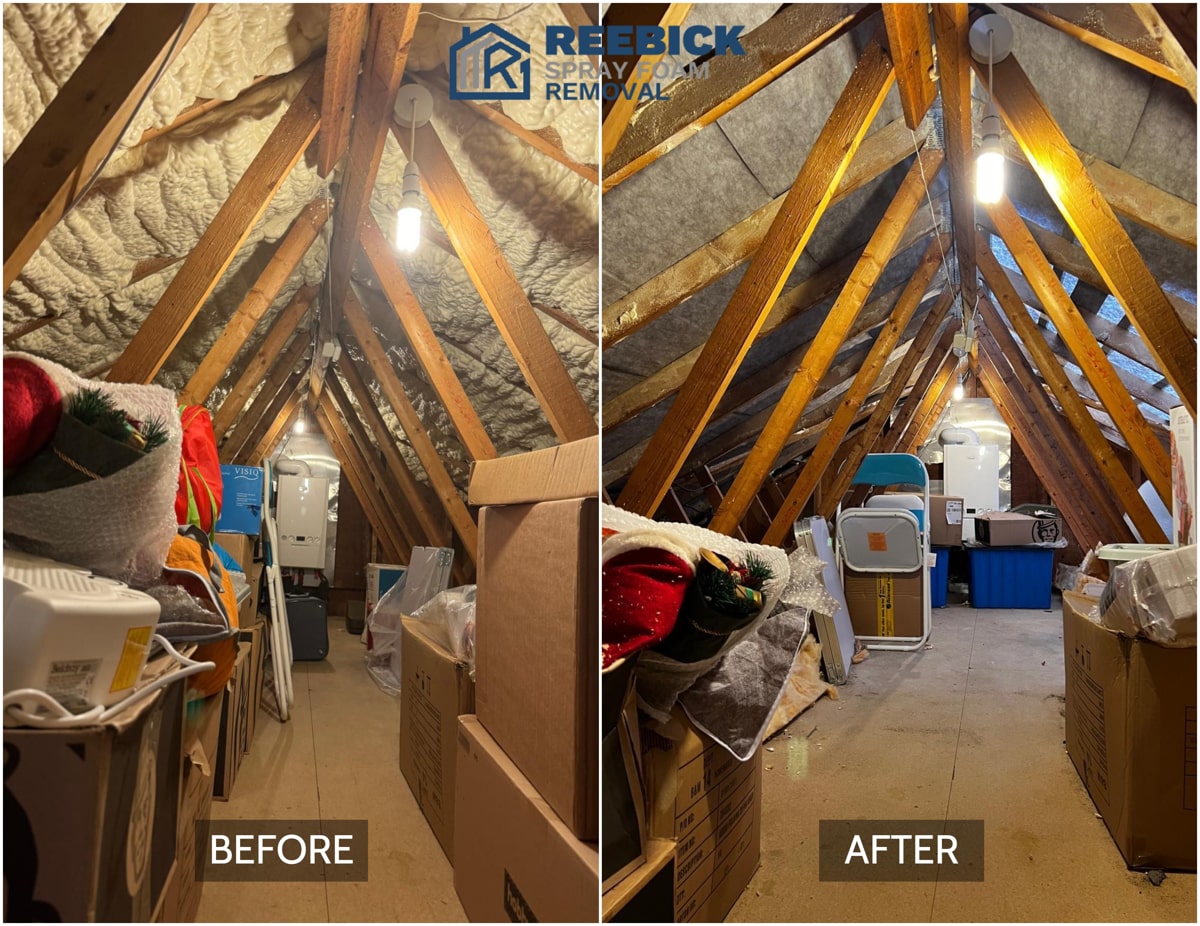The Key Functions of Spray Foam Insulation That Enhance Your Home's Performance
Spray foam insulation supplies several vital functions that greatly improve a home's performance. Its premium air sealing capacities produce a barrier against air leakage, improving power performance. Paired with high thermal insulation and wetness resistance, it adds to an extra comfy living atmosphere. Recognizing these facets can lead to educated decisions about home insulation. Nonetheless, the benefits extend past comfort and effectiveness, motivating a closer evaluation of its general influence on home maintenance and costs.
Superior Air Sealing Capabilities

Improved Thermal Insulation
While lots of insulation products supply some degree of thermal resistance, spray foam insulation masters producing a very effective thermal barrier. This distinct item expands upon application, loading gaps and crevices that standard insulation typically leaves revealed. The closed-cell structure of spray foam substantially lowers heat transfer, trapping warmth in the wintertime and keeping interiors cool in the summer.

Its capacity to adjust to irregular forms and hard-to-reach areas guarantees detailed protection, further enhancing its insulating homes. Basically, spray foam insulation not just fulfills but goes beyond modern insulation requirements, making it a compelling choice for those seeking to enhance their home's energy performance.
Wetness and Mold Resistance

Power Performance and Expense Cost Savings
Energy performance is a substantial advantage of spray foam insulation, as it minimizes air leakages and thermal linking, leading to decreased power usage for heating and air conditioning. here are the findings This insulation type increases upon application, filling also the smallest spaces and providing a constant obstacle. As a result, property owners experience a much more steady indoor temperature level, lowering dependence on heating and cooling systems.
The improved power effectiveness translates right into concrete expense financial savings on utility bills, making spray foam insulation an economically sound investment. Over time, the reduction in power consumption can result in substantial financial savings, validating the initial setup prices. Additionally, lots of home owners might certify for energy efficiency refunds, additionally boosting the monetary advantages.
Convenience and Application Adaptability
Spray foam insulation supplies remarkable flexibility and application adaptability, making it ideal for a variety of structure projects. This sort of insulation can be applied in varied atmospheres, varying from domestic homes to business buildings and also industrial centers. Its capability to satisfy uneven surface areas enables it to fill up voids and gaps successfully, ensuring remarkable thermal efficiency.
Additionally, spray foam insulation is available in various formulations, including open-cell and closed-cell kinds, accommodating certain needs such as soundproofing or dampness control. spray foam removal. It can be made use of in attics, walls, cellars, and crawl rooms, demonstrating its flexibility across various building and construction circumstances
In addition, the simplicity of application suggests it can be installed swiftly, reducing labor costs and project timelines. Overall, the adaptability and application versatility of spray foam insulation make it an outstanding selection for improving energy effectiveness and convenience in a variety of building tasks.
Often Asked Questions
How Lengthy Does Spray Foam Insulation Last?
Spray foam insulation commonly lasts in between 25 to 80 years, depending upon factors such as application quality, environmental conditions, and maintenance. Its toughness contributes significantly to lasting energy efficiency and architectural integrity in various setups.
Is Spray Foam Insulation Safe for Indoor Air Quality?
Spray foam insulation, when correctly set up and cured, is usually risk-free for indoor air high quality. Nevertheless, it is important to assure ample air flow during application and to choose low-VOC options to reduce potential health and wellness risks.
Can I Apply Spray Foam Insulation Myself?
Using spray foam insulation oneself is feasible, however calls for careful interest to safety and security and application techniques. Experts usually advise employing experts to assure appropriate installation and avoid possible threats related to incorrect handling and application.
What Is the R-Value of Spray Foam Insulation?
The R-value of spray foam insulation normally varies from 6 to 7 per inch, depending on see this the formulation (spray foam removal). This high thermal resistance makes it an effective selection for boosting power effectiveness in residential structures
Just How Does Spray Foam Insulation Affect Home Resale Value?
Spray foam insulation positively affects home resale value by enhancing energy efficiency and decreasing utility costs. Possible buyers frequently appreciate the long-lasting savings and comfort it provides, making residential properties with this insulation extra eye-catching on the market.
While several insulation products offer some level of thermal resistance, spray foam insulation succeeds in developing a very efficient thermal obstacle. By decreasing moisture intrusion, spray foam insulation aids preserve a drier setting within the home, therefore enhancing total convenience and security. Power performance is a substantial benefit of spray foam insulation, as it minimizes air leaks and thermal bridging, resulting in decreased energy intake for heating and air conditioning. The boosted power efficiency translates right into concrete price savings on utility expenses, making spray foam insulation an economically audio financial investment. Spray foam insulation favorably influences home resale worth by improving power effectiveness and lowering energy prices.